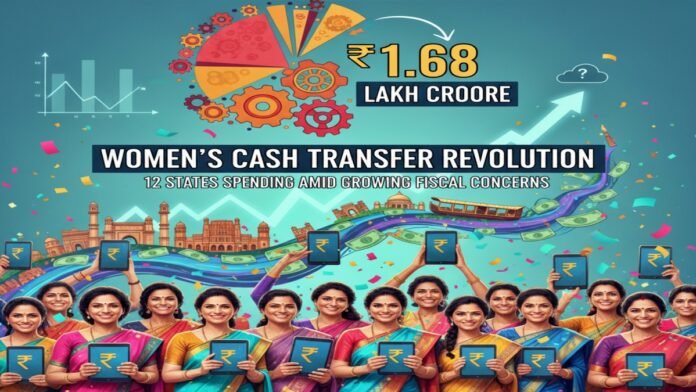
Key Highlights
- Explosive growth: Direct cash transfer schemes for women expanded from 2 states (2022-23) to 12 states (2025-26)
- Massive expenditure: Combined spending of ₹1.68 lakh crore (0.5% of GDP) projected for FY 2025-26, up from 0.2% just two years ago
- Fiscal strain: Six of 12 implementing states face revenue deficit, directly linked to UCT scheme costs
- Monthly benefits: Women receive ₹1,000 to ₹2,500 monthly assistance across different state programs
- Budget adjustments: States like Assam (+31%) and West Bengal (+15%) increased allocations, while Maharashtra reduced payouts to manage finances
- Latest developments: Haryana’s Lado Lakshmi scheme disbursed first installment to over 3.46 lakh women; Jharkhand doubled payments to ₹2,500; Bihar continues phased rollout of Mahila Rojgar Yojana
New Delhi: Unconditional cash transfer (UCT) schemes for women have emerged as India’s fastest-growing welfare initiative, fundamentally reshaping state budgets and political strategies nationwide. According to a comprehensive November 2025 report by PRS Legislative Research, 12 Indian states will collectively spend ₹1.68 lakh crore on direct financial assistance to women in 2025-26, marking an unprecedented sixfold expansion from just two states implementing such programs three years ago.
Unprecedented Fiscal Commitment
The projected expenditure of ₹1.68 lakh crore represents 0.5% of India’s GDP, more than doubling from less than 0.2% spent in 2023-24. These schemes provide monthly financial assistance ranging from ₹1,000 to ₹2,500 directly into women’s bank accounts through Direct Benefit Transfer, targeting economically weaker households based on income thresholds, age eligibility, and residency criteria.
Major schemes leading this transformation include Tamil Nadu’s Kalaignar Magalir Urimai Thogai Thittam, Madhya Pradesh’s Ladli Behna Yojana, Karnataka’s Gruha Lakshmi, Maharashtra’s Ladki Bahin, Bihar’s Mukhyamantri Mahila Rojgar Yojana, and Haryana’s newly launched Lado Lakshmi Yojana.
Six States Grapple with Revenue Deficits
The PRS report reveals a troubling fiscal pattern: six of the 12 states implementing UCT schemes have projected revenue deficits for 2025-26, with their expenditures exceeding income. The direct correlation between scheme costs and fiscal stress becomes evident through adjusted budget analysis.
When UCT expenditures are excluded from calculations, Karnataka’s 0.6% revenue deficit would transform into a 0.3% surplus, while Madhya Pradesh’s modest 0.4% surplus would expand significantly to 1.1% of Gross State Domestic Product (GSDP). This mathematical reality demonstrates that cash transfer schemes are primary drivers of state-level fiscal pressure.
Latest State Actions and Scheme Updates
Haryana’s Aggressive Rollout: The state launched its Deen Dayal Lado Lakshmi Yojana on September 15, 2025, with the first installment disbursed on November 1, 2025, benefiting 3,46,983 women initially. The scheme provides ₹2,100 monthly to women aged 23 and above from families with an annual income below ₹1 lakh. By October 31, 2025, over 6.97 lakh women had registered through the dedicated mobile app, with 6.51 lakh married and 46,168 unmarried applicants.
However, implementation challenges have emerged, with strict eligibility criteria requiring 15 years of Haryana residency and cumbersome documentation processes limiting actual beneficiary numbers to approximately 5.22 lakh women from an eligible pool of 95 lakh adult women.
Jharkhand’s Increased Commitment: In October 2024, the state doubled its monthly payout under the Chief Minister Maiyan Samman Yojana from ₹1,000 to ₹2,500, making it the highest monthly benefit among all states.
Bihar’s Phased Approach: The state’s Mukhyamantri Mahila Rozgar Yojana continues disbursing ₹10,000 initial assistance to women entrepreneurs, with over 12.1 million beneficiaries receiving funds across multiple installments. The government schedules regular disbursements through December 2025, with additional support of up to ₹2 lakh available for businesses sustained beyond six months.
Pre-Election Budget Surges
States facing upcoming assembly elections have dramatically increased allocations for women’s UCT schemes. Assam raised its budget by 31% compared to the 2024-25 revised estimates, while West Bengal increased spending by 15%. These pre-election spending spikes highlight the immense political capital associated with direct cash transfers to women voters.
Maharashtra’s Budget Correction
Facing severe fiscal constraints, Maharashtra implemented significant modifications to its Chief Minister Ladki Bahin Yojana in April 2025. The state reduced monthly benefits from ₹1,500 to ₹500 for women already receiving ₹1,000 under separate direct benefit transfer schemes for farmers, demonstrating the difficult trade-offs states face between political commitments and fiscal sustainability.
Reserve Bank’s Sustainability Warnings
The Reserve Bank of India has issued explicit warnings about the long-term economic implications of expanding welfare commitments. The central bank cautions that escalating expenditure on cash transfers to women, youth, and farmers is reducing states’ fiscal capacity for productive infrastructure investments that generate sustainable economic growth and employment opportunities.
The RBI’s concern focuses on opportunity costs: resources allocated to monthly cash transfers cannot simultaneously fund education infrastructure, healthcare facilities, industrial development, or transportation networks that could enhance long-term state revenue generation capacity and economic competitiveness.
Political Calculus Versus Fiscal Reality
The rapid proliferation of women’s UCT schemes across the political spectrum demonstrates their extraordinary electoral appeal. Political parties credit these programs with decisive electoral victories, while opposition parties consistently promise similar or enhanced schemes during campaigns. This creates powerful political incentives for continuous expansion despite mounting fiscal pressures.
Schemes like Gruha Lakshmi in Karnataka, Ladli Behna in Madhya Pradesh, and Ladki Bahin in Maharashtra have become defining features of state welfare policy, with beneficiaries expressing strong satisfaction despite the financial burden on state exchequers.
Implementation Challenges and Exclusion Concerns
Despite widespread popularity, implementation challenges have emerged across multiple states. Critics highlight eligibility restrictions that exclude large segments of intended beneficiaries. In Haryana, civil society organizations note that fewer than 4% of adult women qualify under current criteria, with requirements like 15-year residency and complex documentation creating significant barriers.
The gap between political promises and actual benefit delivery has generated skepticism about similar announcements in poll-bound states, with activists questioning whether schemes will maintain promised benefit levels and eligibility breadth after elections conclude.
Future Sustainability Questions
As the number of implementing states continues growing and existing schemes face pressure to increase benefit amounts, fundamental questions about long-term financial sustainability intensify. The PRS report’s findings demonstrate that current spending levels significantly impact state fiscal health, with multiple states already experiencing revenue deficits directly attributable to UCT expenditures.
States must navigate the competing demands of immediate voter welfare expectations against future fiscal stability, productive investment requirements, and economic development imperatives. The challenge for policymakers involves designing welfare frameworks that provide necessary support to vulnerable populations while maintaining fiscal discipline and growth-oriented spending patterns.
The coming years will test whether states can sustain current expenditure trajectories or whether widespread program modifications become necessary to restore fiscal balance and preserve capacity for infrastructure investments essential to long-term economic prosperity.









































